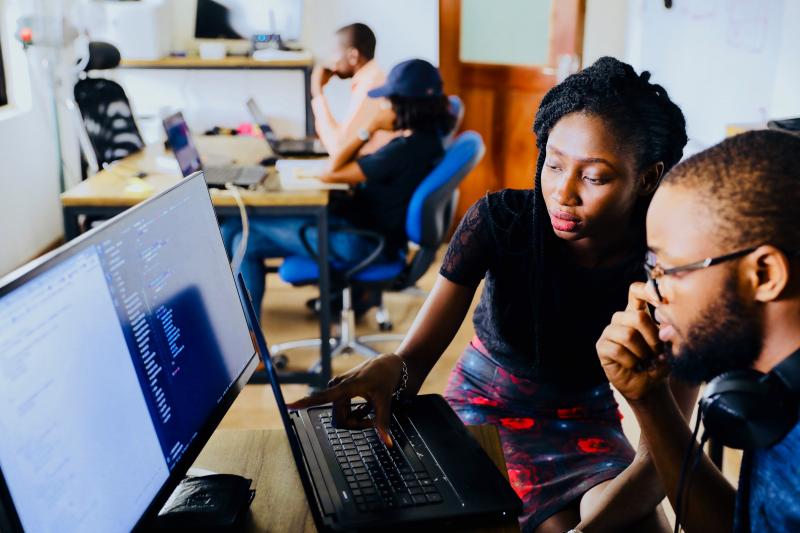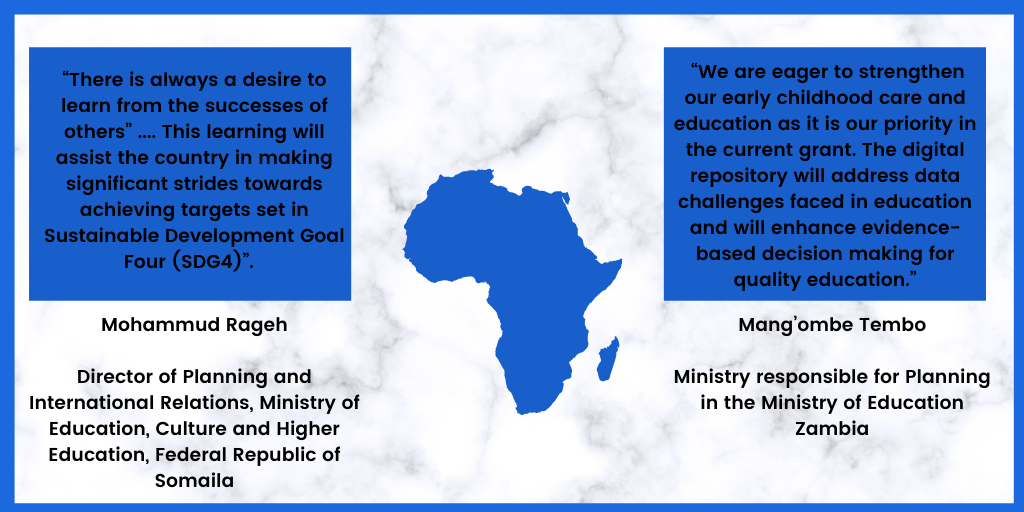
Education stakeholders in Africa knew they could learn a lot from each other, but the question was how to share knowledge and innovations about education. That’s where the Global Partnership for Education Knowledge and Innovation Exchange (KIX) comes in. As part of its mission to respond to national priorities and facilitate inter-country learning, KIX is putting tools in place to fill that gap.
“KIX provides a unique opportunity to enable, nurture and facilitate these conversations between the professionals who – in their own words – ‘never get the chance to talk to each other”, says Joy Nafungo, Senior Program Officer for KIX.
This ‘south-south’ learning took an important step forward in December 2020 with the launch of the Digital Repository by the KIX Africa 19 hub. The repository is a tool to facilitate the exchange of knowledge and resources in education in the hub’s 19 member countries including stakeholders and the general public. Unlike the KIX Library, which contains evidence-based resources on education innovations across the entire cohort of KIX projects and hubs as well external education stakeholders, this repository is uniquely focused on evidence from the countries that are covered by the Africa 19 hub across East, West and southern Africa.
“The repository was developed to be a one-stop resource for African education policymakers” says Yvonne Risper Mboya, a Monitoring, Evaluation and Learning consultant at the KIX Africa 19 hub. “It was set up to surface, make visible and share the knowledge of its members.” According to Mboya, “it is this community – the education experts, researchers, government officials, policy makers and other stakeholders working to improve educational outcomes globally – who hold the answers.”
Valentino Zimpita, Deputy Director for Higher Education, Ministry of Education Science and Technology (MoEST) in Malawi and KIX Focal Point believes that “it is very important to exchange knowledge so that we can move together. Through this (the digital repository) we are going to ensure that policies made in different countries are informed by data, not just within the country but from the continent.”
In an assessment of ICT needs of education stakeholders in 2020, KIX identified ‘limited access to relevant knowledge and evidence, its partial use in the complex realities of policy making, and insufficient systems to support its exchange and uptake effect’ as major impediments that hold back meaningful progress in education across Africa.
The collection of knowledge
Since its launch, the digital repository has collected and curated more than 200 documents from the hub’s 19 countries. “Resources include research reports, policy papers, policy briefs, data factsheet, infographics, meeting recordings, country needs assessments, strategic plans and many others” notes Mboya.
“The repository was built in a participatory process that directly involved our most important stakeholders -- country representatives with whom we are always striving to strengthen our relationship” says Mboya. “Regional partners working in education such as UNESCO-IICBA, UNICEF-ESARO, Africa Union and Association for the Development of Education in Africa have also shared their publications” she adds.
Materials found in the repository reflect the six priority areas of the hub:
- Strengthening learning assessment systems;
- Improving teaching and learning;
- Strengthening early childhood care and education (ECCE);
- Achieving gender equality in and through education;
- Leaving no-one behind; and
- Meeting the data challenge in education.
Resources submitted to the repository are carefully selected to facilitate knowledge creation and learning among the countries.
“We will grow the collection to reflect the needs of stakeholders. Currently, there are more resources on learning assessment and teaching, ECCE and gender equality while thin on data management, equity and inclusion” says Mboya. Stakeholders say they “would like to see more resources on sexual and reproductive health in education because this is an area of growing need to address gender inequalities in Africa.”
Although it is early days, stakeholders from Malawi, Kenya, Zambia, Somalia, Nigeria, South Sudan and others agree that the digital repository is catalysing rich information exchange in education in Africa and addressing some of the challenges identified.
 Testimonials from users of the KIX Africa 19 Hub's Digital Repository.
Testimonials from users of the KIX Africa 19 Hub's Digital Repository.
Good ideas spread fast
As the merits of this knowledge repository are becoming obvious to KIX hub members, some of them are replicating it at a national level. In Malawi, where all policies are required to be evidence based, the idea of a repository makes perfect sense. While on one hand this is a good thing, Zimpita says that the directive has thrown them a big challenge. “We need access to all knowledge being generated in the country on education and from other key sectors”, he says.
“Our involvement in the KIX initiative has been beneficial because we now have an idea of what we need to put in place: something similar to Africa 19’s Digital Repository. A ‘one-stop shop’ will go a long way in responding to the government’s call for evidence-based policy making. The information we need will be a click away, instead of the current situation where we make trips to different Ministries to collect information for just one paper” says Zimpita.
“In the Ministry we have a challenge with information exchange in terms of data not being properly shared. We had data silence” says Joy Hara, Chief Economist in the Monitoring and Evaluation Department at MoEST. Now, together with officials in the Ministry, relevant government Ministries and government information technology experts, Hara says they have begun the “process to develop a digital platform that will pull together the currently fragmented resources from different parts of government and make it easily accessible.” He is confident that a portal with information and key indicators for the country will facilitate greater interaction and learning from best practices and challenges that others have faced.
Challenges ahead
The Digital Repository developed by the KIX Africa 19 hub faces a number of challenges. According to stakeholders “poor internet restricts access to the resources, even for institutional based users across Africa.” In Malawi, for example, internet access is intermittent for the majority and coupled with power outages, accessing online repositories can be frustrating.
Awareness of the new digital services is still low, but a visibility campaign is in the works. The challenges brought about by the COVID-19 pandemic have shown a need for digital resources that can be accessed by greater numbers of people from wherever they are based. The World Bank Group is calling for urgent action to close the internet access gap in Africa, while programs like KIX continue to push the boundaries of what is possible when it comes to sharing information and the power that brings.
